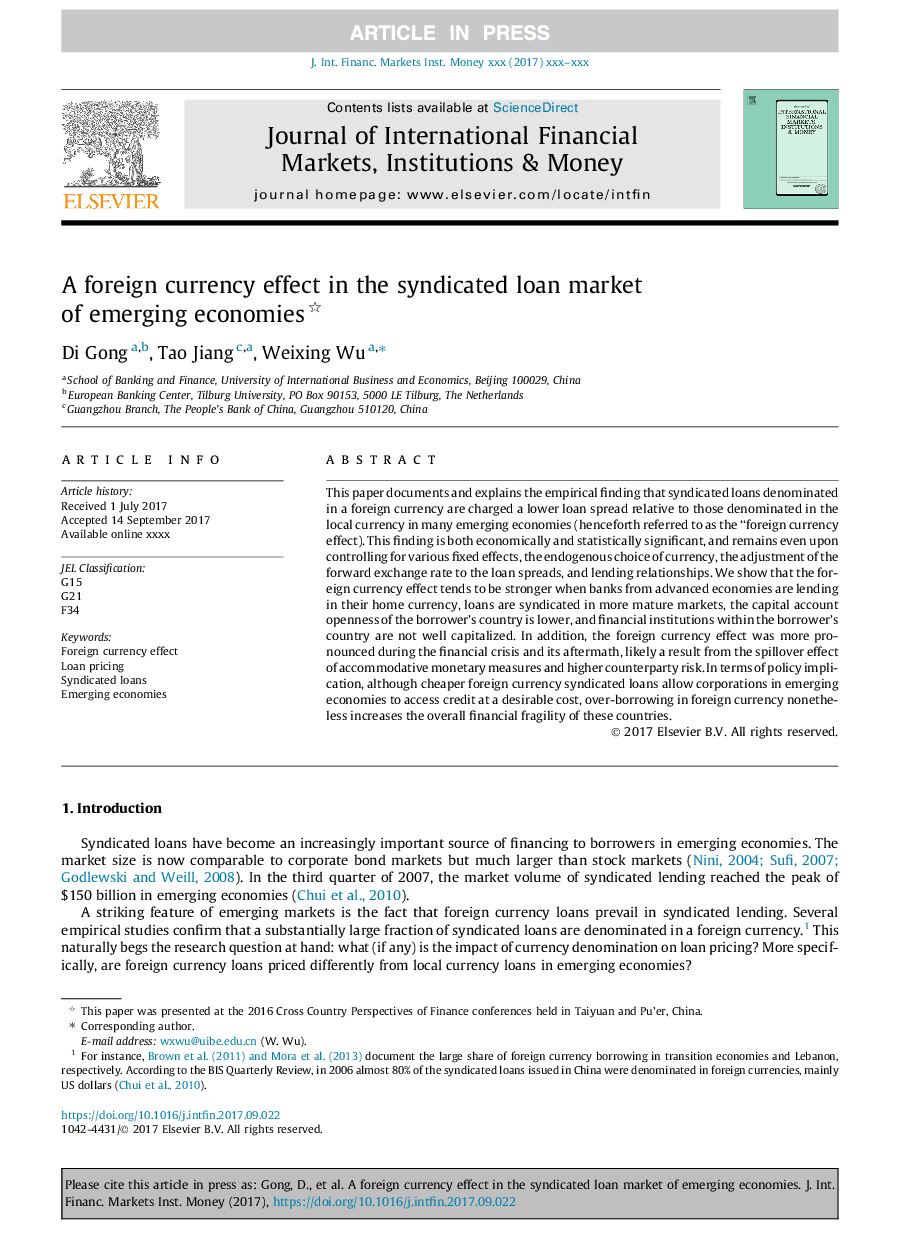| کد مقاله | کد نشریه | سال انتشار | مقاله انگلیسی | نسخه تمام متن |
|---|---|---|---|---|
| 7364357 | 1479095 | 2018 | 16 صفحه PDF | دانلود رایگان |
عنوان انگلیسی مقاله ISI
A foreign currency effect in the syndicated loan market of emerging economies
ترجمه فارسی عنوان
اثر ارز خارجی در بازار وام های سندیکا از اقتصادهای در حال ظهور
دانلود مقاله + سفارش ترجمه
دانلود مقاله ISI انگلیسی
رایگان برای ایرانیان
کلمات کلیدی
ترجمه چکیده
در این مقاله، یافته های تجربی نشان می دهد که وام های سندیکال در یک ارز خارجی، یک نرخ پایین وام نسبت به آنهایی که در پول های محلی در بسیاری از اقتصادهای در حال ظهور تعریف شده اند (به این ترتیب به عنوان یک اثر ارز خارجی اشاره می شود) پرداخت می شود. این یافته هم از لحاظ اقتصادی و هم از لحاظ آماری معنی دار است و همچنان حتی بر روی کنترل اثرات مختلف ثابت، انتخاب انتخاب درونی ارز، تنظیم نرخ ارز مستقیم به گسترش وام و روابط وام دهی باقی می ماند. ما نشان می دهیم که اثر ارز خارجی، زمانی که بانک ها از اقتصادهای پیشرفته درامورهای خود را وام می دهند، تاثیر می گذارد، وام ها در بازارهای بالاتری سندیکا می شوند، بازده سرمایه از کشور وام گیرنده پایین تر است و موسسات مالی در داخل کشور وام گیرنده خوب نیست. علاوه بر این، اثر ارز خارجی در طول بحران مالی و پیامدهای آن بیشتر مشهود بود، که احتمالا ناشی از تاثیر مخرب اقدامات پولی قابل قبول و خطر بیشتر طرفین است. با توجه به معیارهای سیاست، اگر چه وام های ارزان تر از سندیکای ارز خارجی اجازه می دهد که شرکت ها در اقتصادهای نوظهور برای دسترسی به اعتبار با یک هزینه مطلوب، بیش از حد قرض گرفتن در ارز خارجی، شکنندگی های مالی کلی این کشورها را افزایش می دهد.
موضوعات مرتبط
علوم انسانی و اجتماعی
اقتصاد، اقتصادسنجی و امور مالی
اقتصاد و اقتصادسنجی
چکیده انگلیسی
This paper documents and explains the empirical finding that syndicated loans denominated in a foreign currency are charged a lower loan spread relative to those denominated in the local currency in many emerging economies (henceforth referred to as the “foreign currency effect). This finding is both economically and statistically significant, and remains even upon controlling for various fixed effects, the endogenous choice of currency, the adjustment of the forward exchange rate to the loan spreads, and lending relationships. We show that the foreign currency effect tends to be stronger when banks from advanced economies are lending in their home currency, loans are syndicated in more mature markets, the capital account openness of the borrower's country is lower, and financial institutions within the borrower's country are not well capitalized. In addition, the foreign currency effect was more pronounced during the financial crisis and its aftermath, likely a result from the spillover effect of accommodative monetary measures and higher counterparty risk. In terms of policy implication, although cheaper foreign currency syndicated loans allow corporations in emerging economies to access credit at a desirable cost, over-borrowing in foreign currency nonetheless increases the overall financial fragility of these countries.
ناشر
Database: Elsevier - ScienceDirect (ساینس دایرکت)
Journal: Journal of International Financial Markets, Institutions and Money - Volume 52, January 2018, Pages 211-226
Journal: Journal of International Financial Markets, Institutions and Money - Volume 52, January 2018, Pages 211-226
نویسندگان
Di Gong, Tao Jiang, Weixing Wu,
